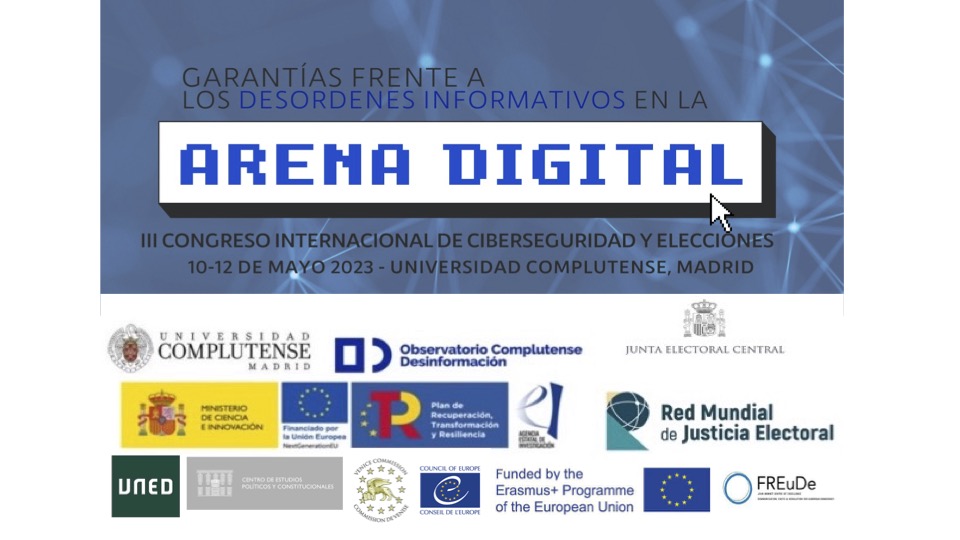Guarantees against information disorders in the digital arena. Democracy, rights and elections. III International Conference on cybersecurity and elections
10-05-2023 09:00
Facultad de Ciencias de la Información, Avenida Complutense, Madrid, España
Organizado por Proyecto SN-DISORDERS, Proyecto NextGen Cyber-Elections, Grupo de investigación UCM sobre tecnología y democracia. Grupo Investigación UCM Regulación Jurídica y Participación del Ciudadano Digital,Universidad Nacional de Educación a Distancia
The registration has finished.

Guarantees against information disorders in the digital arena. Democracy, rights and elections.
III International Conference on cybersecurity and elections
The exponential advance of technology, the information disorders that have been emerging and their impact on electoral campaigns pose new challenges to democracy. Not only to the institutions of the States and their electoral authorities, it also affects the traditional function of the free press, which is another guarantee of our democratic systems, to which the impacts of changes in participation, audiences and also by the presence of large international platforms reach.
This is the final Conference of the SN-Disorders Project of the State Research Agency (Project/AEI/10.13039/501100011033), although the Conference also seeks to give continuity to the International Conferences on cybersecurity and elections organized in 2018 and 2019 by the Complutense research group on Technology and democracy being this the III Conference on Cybersecurity and Elections. In its first two editions the Conference has been able to count on the collaboration of the Chair of Military Law UCM-Ministry of Defense together with entities such as the Center for Political and Constitutional Studies, the Global Network of Electoral Justice and the Electoral Tribunal of the Judiciary of the Federation of Mexico.
This year, in addition to the aforementioned research group, the NextGen Cyber-elections Project, which has also attracted the interest of important national and international institutions in the field of elections, is also in charge of the organization. The Universidad Nacional de Educacion a Distancia, the Center of Political and Constitutional Studies and the Global Network for Electoral Justice are also co-organizers.
The Conference will focus on studying topics such as democracy, the communication rights in electoral periods and in general in political campaigns, legislation and technological advances, on-line democracy, transparency and good governance in electoral processes, the analysis of the electoral reality and political campaigns in social networks, the role of platforms and social networks and their response to European recommendations. We also propose to study AI (Artificial Intelligence) in electoral processes, and the opportunities offered by transparency in this technological field, specifically in the moderation or blocking of content by platforms.
Regarding the legislative environment in these fields, we will pay attention to, among others, public policies and regulatory proposals to in this Conference: the new European Digital Services Act (DSA), which is already in force and affects service providers, the recently proposed European Media Freedom Act to combat disinformation in conventional media, the proposed regulation to require greater transparency in political advertising, the conclusions of the European Parliament on the impact of foreign electoral interference and its risks to democratic stability, or the suspension of portals or channels such as RT or Sputnik in march, and more recently, in December, that of Pervi Kanal, NTV Mir, REN-TV.
The role of the media in disinformation will also be analyzed, with special attention to the reality of pseudo-media, alternative channels for the dissemination of messages and their possible regulation.
We will also analyze the latest developments of institutions that are working on the issue such as the Council of Europe or the Venice Commission and review what has happened in elections held in recent years. We will also present the latest changes in the use policy of platforms such as Facebook, Google or WhatsApp.
As usual, all these topics will be addressed not only from the academic perspective (communication, law and political science), but we want to have the point of view and practical experience of politicians, consultants, responsible for social platforms, electoral justice bodies and public responsible for cybersecurity.
Contact information
Conference Secretariat
Department of Constitutional Law
Office 225 Faculty of Information Sciences
Patricia Muñoz patmun02@ucm.es

